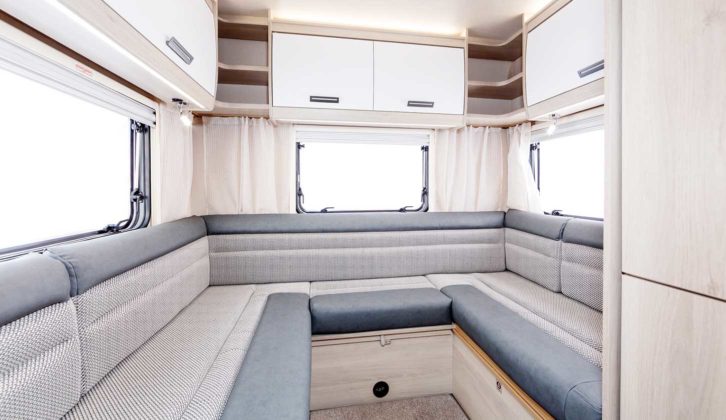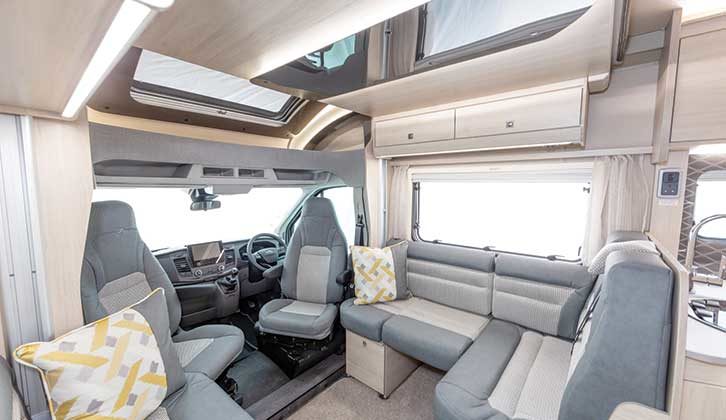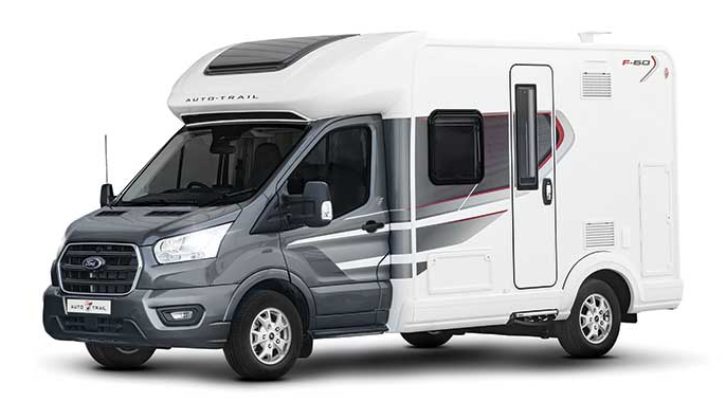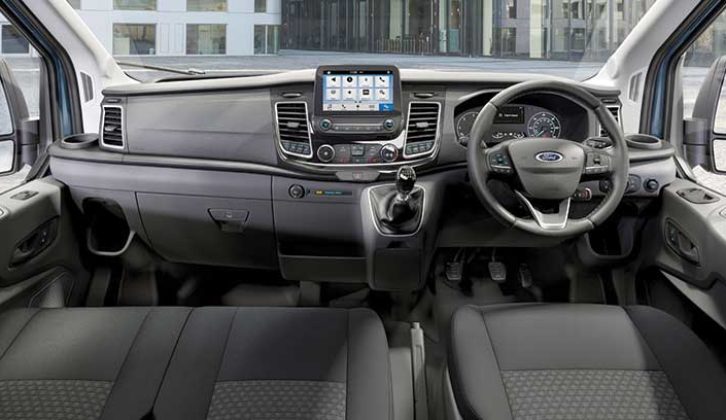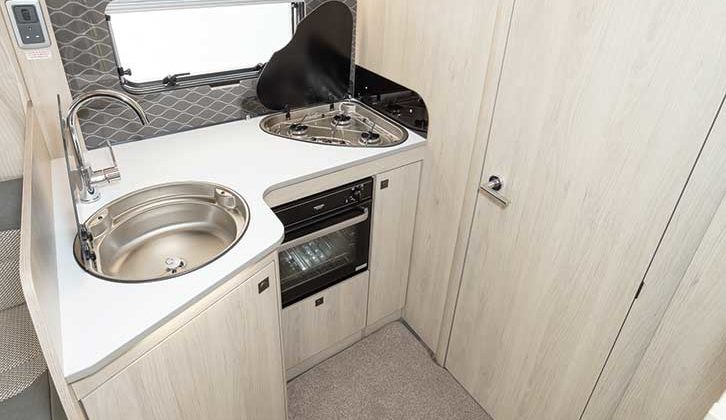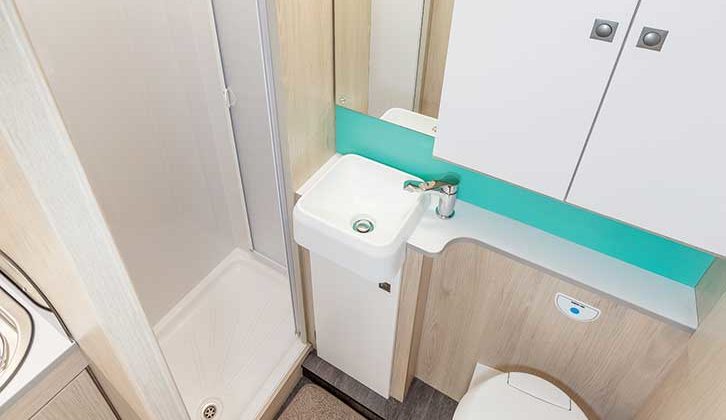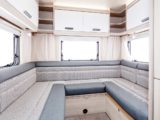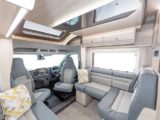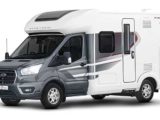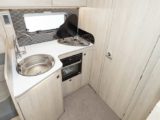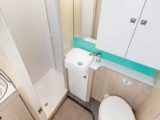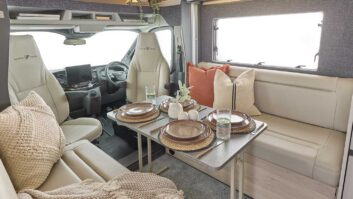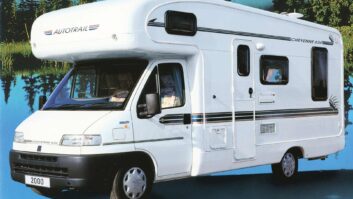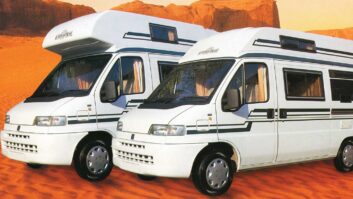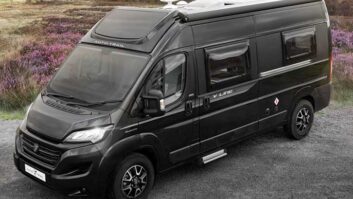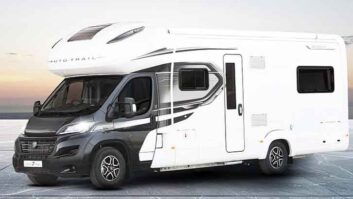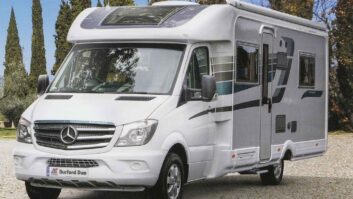Auto-Trail has a long history of converting Fords, although their usage has not been continuous. One of the most venerable Auto-Trail models in existence is a very early 1980s conversion of a pre-owned Ford A-Series.
Next came Transit conversions, a panel van conversion (known as the Stag) and from 2010–2016, a range of sharply priced, value-for-money coachbuilts, monikered Tribute.
Our featured Fords launched in 2020 and were also (briefly) Tributes, until the name changed to F-Line in spring the following year.
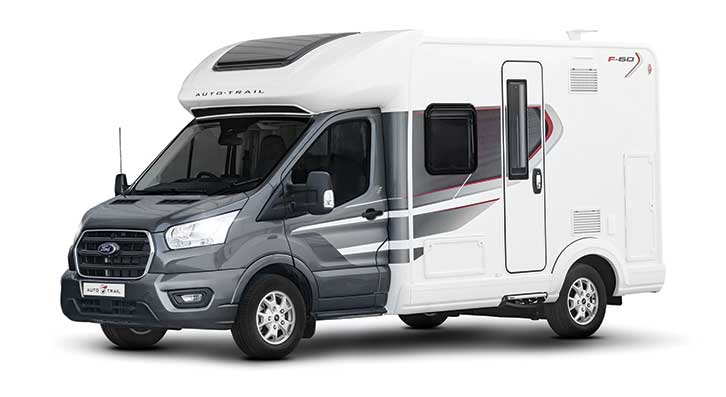
Unveiled at the launch were four low-profile overcab coachbuilts, all featuring an electrically operated rise-and-fall transverse double bed immediately behind the cab. The bed can be left permanently made up and when stowed away, has little effect on the available headroom.
This generation of Ford Transit underpinned Auto-Trail coachbuilts provided a more upmarket interior vibe than their predecessors, thanks to the use of the all-new Salinas Oak (light) finish to the cabinetwork, and the choice of contemporary Tamsin colourways for the soft furnishings.
The launch offer consisted of four models at two lengths. First up are the 5.99m (19’ 8”) two-berth F60 and F62. Both make use of swivelling cab pews in the forward lounge area. These are augmented by a brace of twin-seat, inward-facing settees.
The F60 has a centrally located kitchen and a full-width rear changing area/washroom. The F62 boasts an L-shaped nearside kitchen, which extends halfway across the rear panel. Directly behind the offside lounge settee is the wardrobe, which is ahead of a linear changing area/washroom.
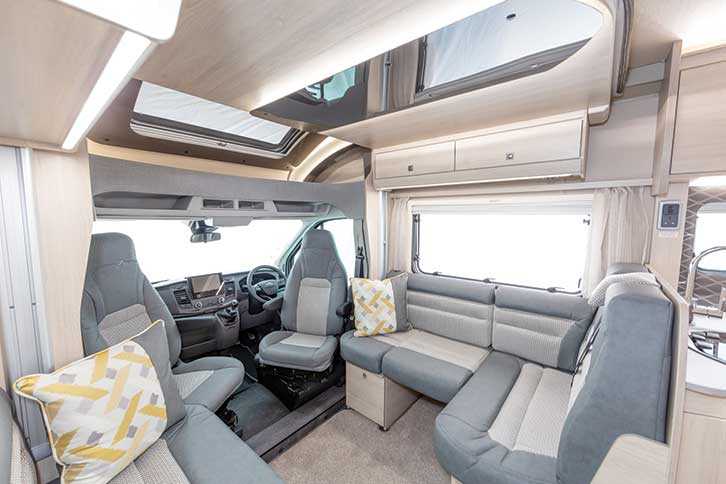
Stretching the tape to 7.34m (24’ 1”) are the four-berth F70 and F72. Both have a similar lounge to the compact F60s. Both the F70 and the F72 share a centrally placed offside kitchen with the washroom opposite. It is at the far rear of the ’van where the most significant differences occur.
The F70 features twin permanent longitudinal single beds (see: our best motorhome with fixed single beds guide for more inspiration), whereas the F72 opts for a U-shaped lounge.
The F74 appeared in 2021. Its layout is similar to that of the F70, until you reach the far rear, where the F74’s USP is a permanent low-level island double bed, with a wardrobe and nightstand for each occupant (see: our best island bed motorhome guide if you’re looking for a luxurious sleeping experience in your ‘van).
Finally, the Auto-Trail F68, a mid-length model (6.8m/22’ 3.75”), was added in 2022. This is the only F-Line in which the rear lounge converts into easy-access single beds, or alternatively, to a truly palatial ‘all-over’ double. The ’van is a dedicated two-berth, so it doesn’t have a forward rise-and-fall double bed.
Overall, the standard specification is good, with a large fridge-freezer and an inset aluminium hob and sink, plus underfloor space and water heating courtesy of Whale. The latter units free up valuable locker space that would be taken up by rival boilers.
It did seem a bit odd not to include a microwave, but this is probably due to payload concerns, not parsimony.
I have road-tested several of this generation of Transit chassis-cabs and can confirm that they are both engaging and relaxing to drive.
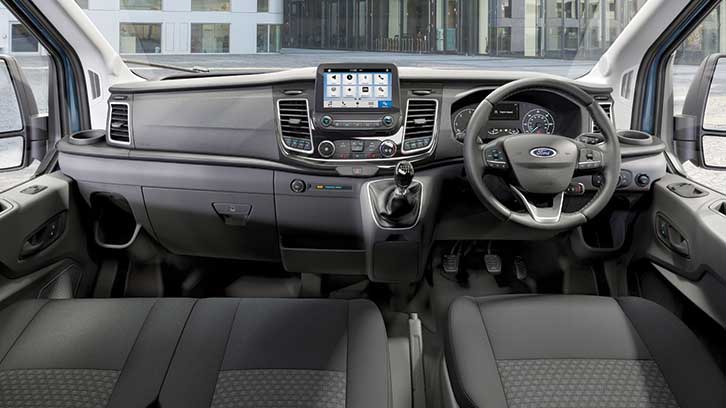
The engines are good, but so are the competition’s offerings. Where the Transit noses in front of the others is first, in the cab seating ergonomics, and second, with its spectacularly well-judged, compliant ride. This is really surefooted, but without the overfirm ride of my own Al-Ko underpinned coachbuilt.
Shorter and taller drivers will find the infinitely adjustable seats, mounted lower than many, a real plus point.
Ford Transits are a good choice for those who are intending to keep their ’van for a long time. Spares are still easily sourced for models that are over 30 years old. That’s the F-Line in a nutshell… affordable luxury!
What to look out for in an Auto-Trail F-Line
Base vehicle
This generation of Transit was well sorted by the time the earliest F-Lines were built. But nothing is perfect and there have been a few reports about the diesel particulate filter not regenerating on low-mileage examples, and failure of drive couplings on high-milers. However, both niggles are quite rare, considering the huge number sold.
Look for a full service history and ensure all warning lights within the instrument nacelle light up just before starting, and extinguish after start-up – apart from the handbrake light!
Conversion
A yearly inspection and written report by an approved engineer is required to maintain the water ingress warranty, so make sure that these have been completed in a timely manner.
The only Achilles’ heel of the range applies to longer F-Lines. It is their low available payload with four adults aboard (F70: approximately 137kg). This is a result of the understandable decision to build all on the 3500kg chassis, so anyone with an ordinary car driving licence can get behind the wheel. Auto-Trail has a brilliant ‘van plus options’ weight calculator on its website, so customers can make an informed purchasing decision.
After-market chassis upgrades are available, although a group C1 licence would then be required.
What we like about the Auto-Trail F-Line range:
- Ford base vehicle
- The ride
- Contemporary interior vibe
- Choice of lounge seating for the original purchaser
- Unobstructed underseat lockers
What we dislike about the Auto-Trail F-Line range:
- Low payload on some models
- No microwave
Our pick
The fact that all motorhome layouts are continuing indicates there isn’t a lemon. The F60 for singles or couples, F72 for families. Personal favourite: F68. Automatic transmission preferably, plus a 170bhp engine if possible, although the latter would not be a deal-breaker.
What to pay
Even the oldest shorter models will be well over £50,000. Motorhome Depot (Midlands) currently has a low-mileage 2021 F72 at an asking price of £61,995; Simpsons (Norfolk) has an as-new (just 586 miles) 2021 F74 170bhp automatic for £63,995. New price to similar spec would be £70,728.
There are more affordable Ford-based Auto-Trails on the previous generation Transit, badged Tribute. These start at around £26,000 (private sales) and £28,000 (dealer sales, 2010 models).
Auto-Trail F-Line essentials
- Auto-Trail F-Line on Ford Transit wide-track chassis-cab
- Built 2020– present at Europarc, Grimsby, North Lincolnshire, UK
- Low-profile overcab coachbuilts
- Overall length: 5.99m (19’ 8”) – 7.34m (24’ 1”)
Or you could try…
The Chausson Titanium on a Ford Transit, Roller Team Zefiro (both ranges on Ford Transit).
You can also find out about another model from the manufacturer, the Auto-Trail V-Line, a smart van conversion.
After more used ‘van buyer inspiration? Then what about one of these:
- Murvi Pimento (Ford) (2015-present): this ‘van combines a great layout with excellent manoeuvrability.
- Auto-Sleeper Inca & Sigma (2004-2009): a good size, a good layout and strong residuals – what’s not to like?
- Autocruise Driving range (2007-2014): coming with a luxurious interior, each ‘van in this range is named after a golf course.
If you’ve enjoyed reading this article, why not get the latest news, reviews and features delivered direct to your door or inbox every month. Take advantage of our brilliant Practical Motorhome magazine SUBSCRIBERS’ OFFER and SIGN UP TO OUR NEWSLETTER for regular weekly updates on all things motorhome related.
